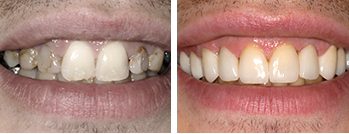Passive Smoking Risks For Children’s Health
Passive smoking can increase the risk of children developing tooth decay and could cause problems with their overall oral health, according to the British Dental Health Foundation.
Recent research shows that young children who were exposed to second-hand smoke experienced a slower rate of development in their oral health; the extent of this negative effect can be directly linked to the amount of second-hand smoke they inhale.
The link between passive smoking and oral health problems has been established in previous studies, but this report focused specifically on its effect on young children.
 According to the Royal College of Physicians, there are approximately two million children in the UK continuously exposed to cigarette smoke.
According to the Royal College of Physicians, there are approximately two million children in the UK continuously exposed to cigarette smoke.
Every year, about 8,500 children are admitted to hospital due to the effects of second-hand smoke, the British Dental Health Foundation said in a press release.
Tooth decay sent 26,000 children under nine to hospital in 2014.
Protecting children from second-hand smoking is the main reason behind the proposal to ban smoking in vehicles transporting children.
Dr. Nigel Carter, Chief Executive of the British Dental Health Foundation, thinks that the ban on smoking in cars is essential for the general improvement of oral health – not just for children but for all second-hand smokers.
Reducing the level of exposure to cigarette smoke could result in lower mouth cancer rates, as the disease is caused by smoking in the majority of cases.
Over the next ten years, mouth cancer is predicted to become even more common, with expected incidence rates of 60,000.
Book your Oral Cancer Screen with Perfect Smile now.
Similar Posts
UK SCIENTISTS RESEARCH TOOTH DECAY IN CHILDREN
Nearly 26,000 primary school children were admitted to hospital for treatment of tooth decay in the past 12 months, making the condition the most common reason for hospitalisation of children between the ages of five and nine, new research shows.
Statistics from the Health and Social Care Information Centre, published in the Sunday Times, reveal that the number of primary school children admitted to hospital for tooth decay rose from 22,574 in 2010-11 to 25,812 in 2013-14.
SHOULD TOOTH DECAY IN YOUNG CHILDREN BE TREATED WITH A FILLING?
According to new research by the University of Manchester, one in ten British children at the age of five have a filling and about two in five have tooth decay.
However, many dental experts claim there is no need to fill milk teeth unless they cause pain or discomfort, as they will fall out anyway.